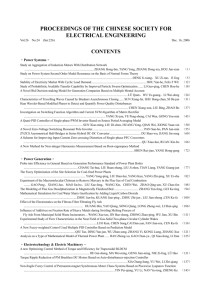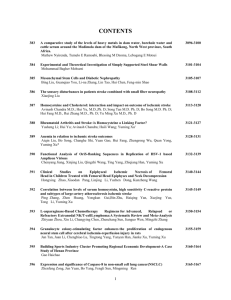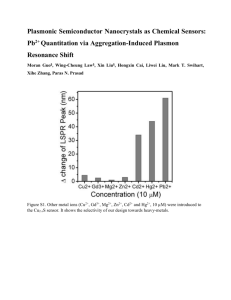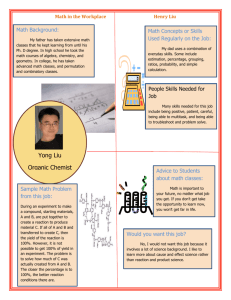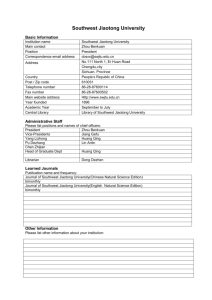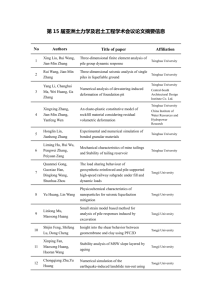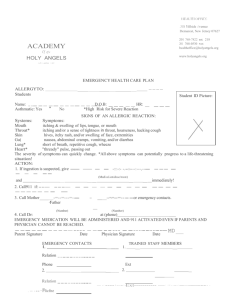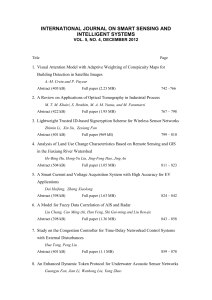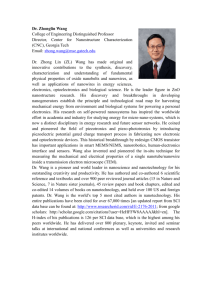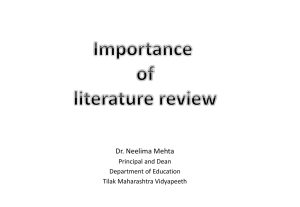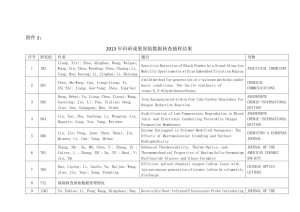2014 International Workshop on Process Aware Systems (PAS2014)
advertisement
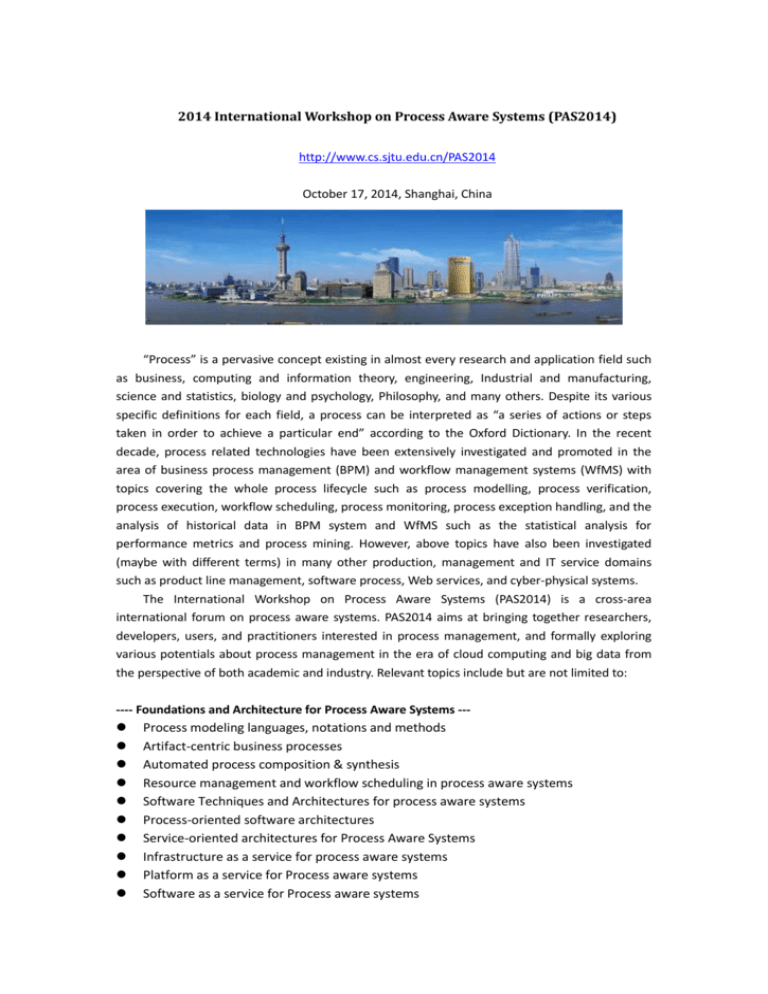
2014 International Workshop on Process Aware Systems (PAS2014) http://www.cs.sjtu.edu.cn/PAS2014 October 17, 2014, Shanghai, China “Process” is a pervasive concept existing in almost every research and application field such as business, computing and information theory, engineering, Industrial and manufacturing, science and statistics, biology and psychology, Philosophy, and many others. Despite its various specific definitions for each field, a process can be interpreted as “a series of actions or steps taken in order to achieve a particular end” according to the Oxford Dictionary. In the recent decade, process related technologies have been extensively investigated and promoted in the area of business process management (BPM) and workflow management systems (WfMS) with topics covering the whole process lifecycle such as process modelling, process verification, process execution, workflow scheduling, process monitoring, process exception handling, and the analysis of historical data in BPM system and WfMS such as the statistical analysis for performance metrics and process mining. However, above topics have also been investigated (maybe with different terms) in many other production, management and IT service domains such as product line management, software process, Web services, and cyber-physical systems. The International Workshop on Process Aware Systems (PAS2014) is a cross-area international forum on process aware systems. PAS2014 aims at bringing together researchers, developers, users, and practitioners interested in process management, and formally exploring various potentials about process management in the era of cloud computing and big data from the perspective of both academic and industry. Relevant topics include but are not limited to: ---- Foundations and Architecture for Process Aware Systems -- Process modeling languages, notations and methods Artifact-centric business processes Automated process composition & synthesis Resource management and workflow scheduling in process aware systems Software Techniques and Architectures for process aware systems Process-oriented software architectures Service-oriented architectures for Process Aware Systems Infrastructure as a service for process aware systems Platform as a service for Process aware systems Software as a service for Process aware systems ---- Big Data and Cloud Computing for Process Aware Systems -- Big data and big process management Big data processing and big process mining Cloud-based BPM and Workflow as a Service Security, privacy and trust in Big data/Cloud-based BPM Business process crowdsourcing based on social networks Business process in hybrid cloud environments Scientific workflows in the cloud ---- Monitoring, Adaptation and Improvement of Process Aware Systems -- Process tracing and monitoring Process performance measurement Process data analytics and visualization Adaptive and context-aware processes Business process lifecycle management Business process improvement ---- Applications and Empirical Studies of Process Aware Systems -- Knowledge-intensive processes Data-driven processes Distributed and mobile processes Inter-process planning and coordination Adoption and Practice of process aware systems Case studies and experience reports Process aware system education and training ---- Software Development Process for Process Aware Systems -- Development processes for emerging and evolving process aware systems Agile/Lean processes in (software) systems development Process issues in developing adaptive and evolving software systems Continuous process improvement in diverse areas and context Distributed/Global development and large-scale processes Process modeling, simulation and analysis Process/Project management and assessment Process metrics and tools Cost estimation and project planning Processes for cutting-edge software technologies, including (but not limited to) ubiquitous computing, cloud computing, multi-core technologies, and cellular technologies ---- Non-software Aspects of Process Aware Systems -- Processes in non-software domains (e.g., business, health care, manufacturing, transportation, etc.) with a demonstrated relationship to process aware systems Modeling of physical and computation processes Integrations of computation, communication, and control processes process -oriented control systems Process technology characterization, extraction, and modeling of design for manufacturability Applied Verification for Continuous and Hybrid Systems Process-variation aware embedded system design =========================== Submission & Publication =========================== Submission Papers should be formatted according to Springer’s Communications in Computer and Information Science (CCIS, http://www.springer.com/series/7899) formatting guidelines (for instructions please visit http://www.springer.com/computer/lncs?SGWID=0-164-6-793341-0). Submissions must be in English and not exceed 15 pages of length. The title page must contain a short abstract clarifying the relation of the paper with the topics above. The paper must clearly state the problem being addressed, the goal of the work, the results achieved, and the relation to other work. Industry papers must be clearly marked as such, so that they can be appropriately reviewed by the program committee. Concerning length and formatting, industry papers must follow the same rules and guidelines as research papers. Papers should be submitted electronically in PDF format via the PAS2014 EasyChair submission site: https://www.easychair.org/conferences/?conf=pas20140 Submissions must be original contributions that have not been published previously, nor already submitted to other conferences or journals in parallel with this conference. Each submission will be peer reviewed by at least three program committee members. Publication All accepted papers will be included in the conference proceedings published by Springer in the CCIS series. For each accepted paper, at least one author must register for the conference and present the paper. =========================== Key Dates =========================== Full papers due: August 10, 2014 Notification of acceptance: September 10, 2014 Camera-ready papers deadline: October 10, 2014 Conference: October 17, 2014 =========================== ORGANIZING COMMITTEE =========================== HONORARY CHAIR GENERAL CHAIRS Jianmin Wang, Tsinghua University, China Yun Yang, Swinburne University of Technology, Australia PROGRAM CHAIRS Jian Cao, Shanghai Jiaotong University, China Lijie Wen, Tsing Hua University, China PUBLICITY CHAIRS Hongyan Zhang, Beijing Jiaotong University, China Jihong Liu, Beijing University of Aeronautics And Astronautics, China PUBLICATION CHAIR Xiao Liu, East China Normal University, China LOCAL ORGANIZATION CHAIR Feng Li, Donghua University, China STEERING COMMITTEE Jianming Wang, Tsinghua University, China Chongyi Yuan, Peking University, China Liang Zhang, Fudan University, China Jianwen Su, The University of California, Santa Barbara, U.S. Arthurter Hofstede, Queensland Univesity Of Technology, Australia PROGRAM COMMITTEE (TBC) Akhil Kumar, Penn State University, USA, akhilkumar@psu.edu Barbara Weber, University of Innsbruck, Austria, Barbara.Weber@uibk.ac.at Marco Aiello, University of Groningen, The Netherlands, M.Aiello@rug.nl Massimo Mecella, Universita' di Roma, Italy, mecella@dis.uniroma1.it Rik Eshuis, Eindhoven University, The Netherlands, h.eshuis@tue.nl Rong Liu, IBM Research, USA, rliu@us.ibm.com Florian Daniel, University of Trento, florianxxl@gmail.com Minseok Song, Ulsan National Institute of Science and Technology, msong@unist.ac.kr Matthias Weidlich, Imperial College London, m.weidlich@imperial.ac.uk Josep Carmona Vargas, Universitat Politecnica de Catalunya (UPC), jcarmona@lsi.upc.edu Fabrizio Maria Maggi, University of Tartu, f.m.maggi@ut.ee Luciano Garcia Banuelos, University of Tartu, luciano.garcia@ut.ee Jiacun Wang, Monmouse University, U.S. Jian Cao, Shanghai Jiaotong University, China Zaiwen Feng, Wuhan University, China Tao Hu, Hannan University, Japan Jianxun Liu, Hunan University of Science And Technology Zongwei Luo, Hongkong University Shiyong Lv, Wayne State University, U.K. Kaijun Ren, National University of Defence Technology, China Li Wan, Huazhong University of Science And Technology, China Jianming Wang, Tsinghua University, China Zhongjie Wang, Harbin Institute Of Technology, China Jinghua Xiong, Institute Of Computing Technology, Chiese Academy Of Science, China Dong Yang, Donghua University, China Jianwei Yin, Zhejiang University, China Yu Yang, Sun Yat-Sen University, China Liang Zhang, Fudan University, China Yang Zhang, Beijing University Of Posts And Telecommunications, China Xiao Liu, East China Normal University, China Lizhen Cui, Shangdong University, China Wanchun Dou, Nanjing University, China Min Liu, Tongji University, China Chun Ouyang, Queensland University Of Technology, Australia Raymond Wong, University Of New South Wales, Australia Zhe Shan, University Of Cincinnati, U.S. Jianwen Su, The University Of California, Santa Barbara, U.S. Mingzhong Wang, Beijing Institute Of Technology, China Lijie Wen, Tsinghua University, China Jun Wei, Institute Of Software, Chinese Academy Of Science, China Jian Yang, Macquarie University, Australia Yuan Chongyi, Peking University, China Mingsong Chen, East China Normal University =========================== Sponsors =========================== Technical Sponsor: Springer Sponsors: Shanghai Jiaotong University East China Normal University Tsinghua University Donghua University
